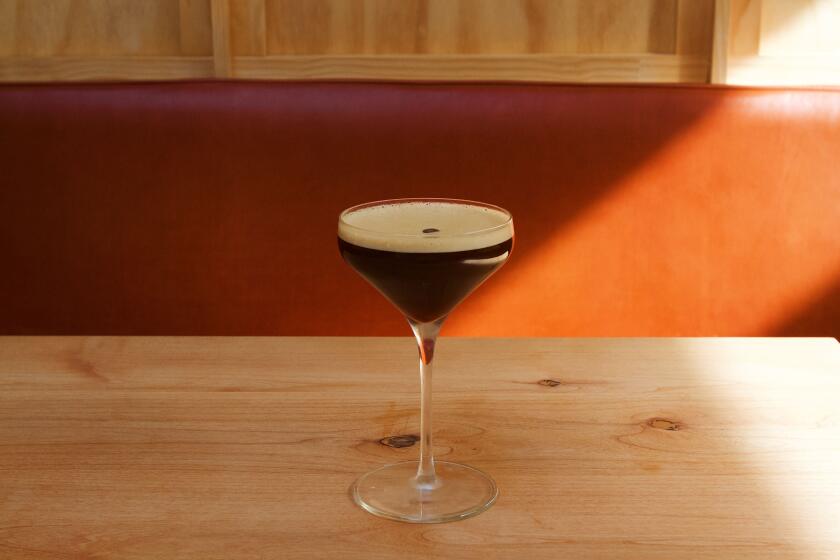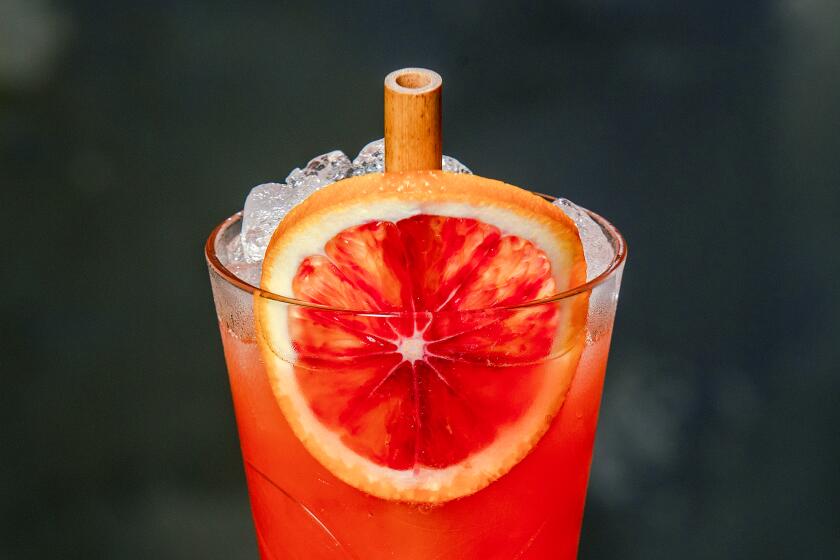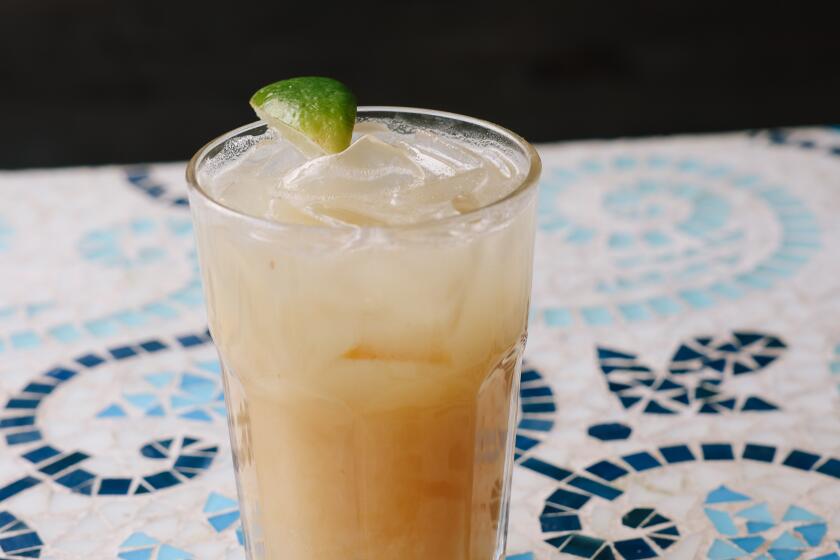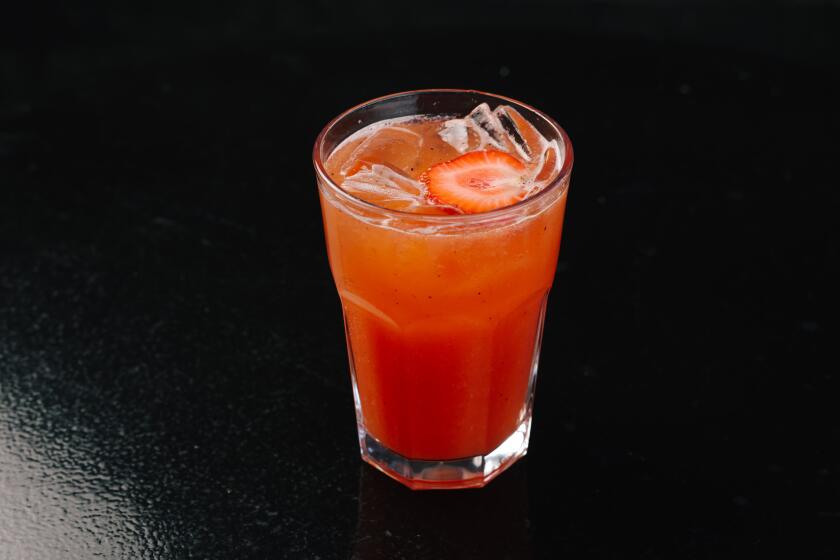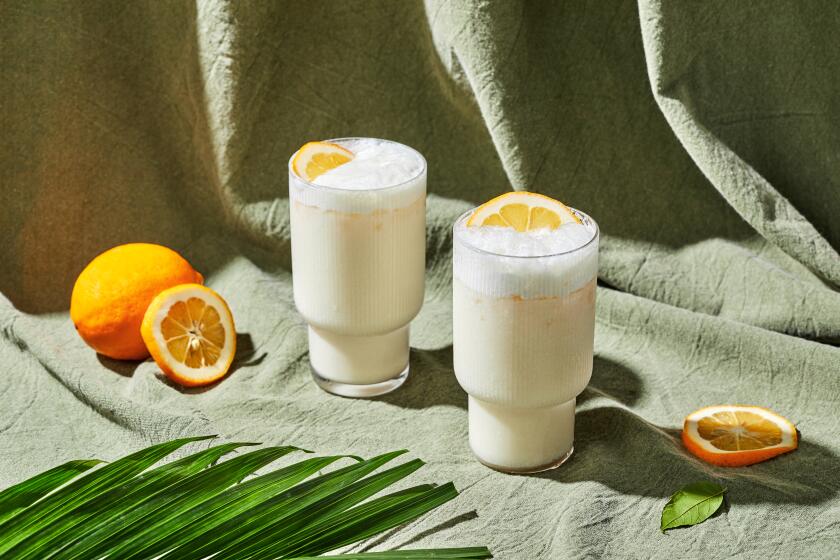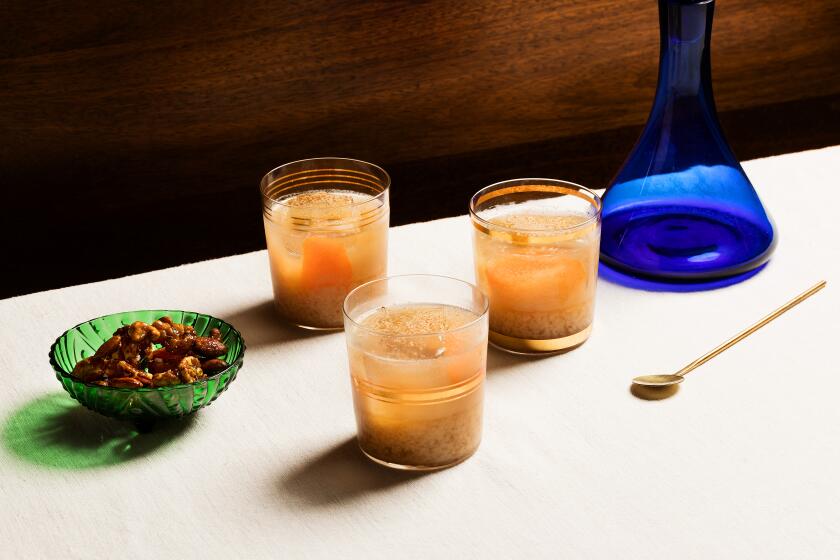Negroni
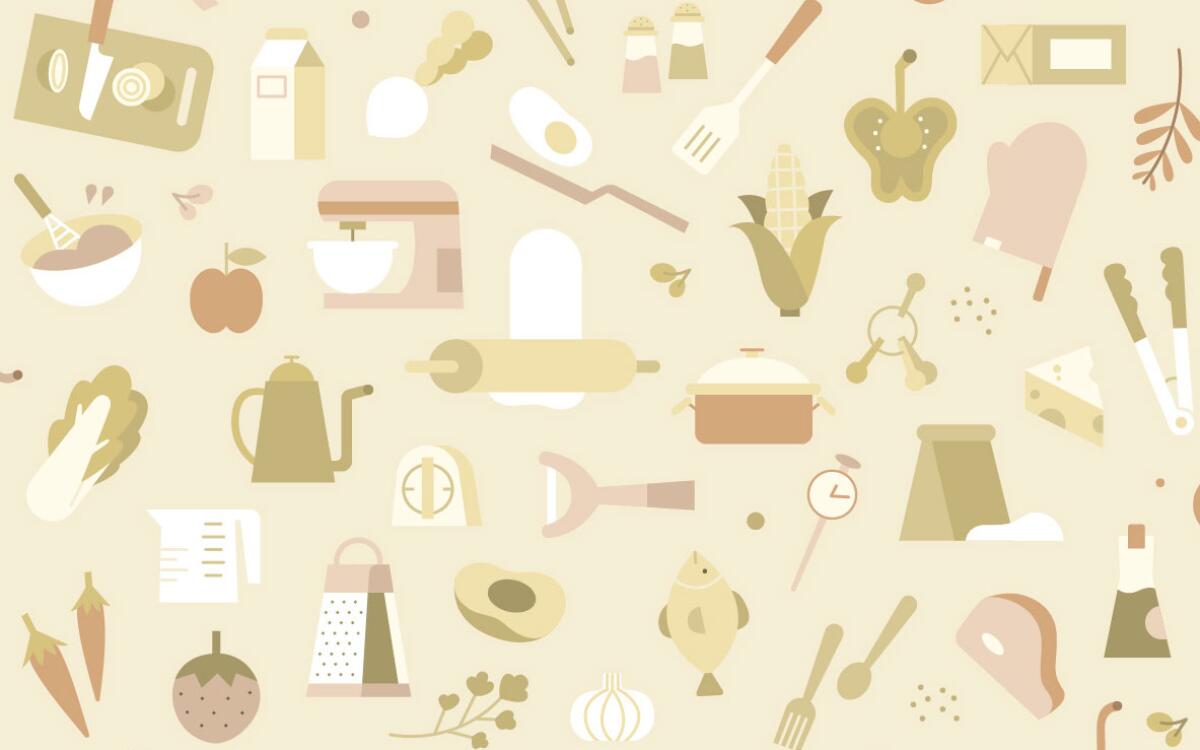
- Share via
It is a scorchingly hot day in Las Vegas as I retreat inside Desert Passage, a faux-casbah mall inside the Aladdin resort. Hot and sticky, I agree to let a pedicab driver whisk me past life-size stone elephants and a sultan’s palace decorated with iridescent mosaic tile in my search for a quenching cocktail on this steamy summer afternoon. My driver assures me he knows just the place. Moments later, we arrive at a daiquiri bar whose main feature is a wall of Slurpee machines turning out an array of alcoholic snow cones offered in a ghastly lineup of flavors: hurricane, margarita, bellini, pina colada and so forth.
My pedicab driver pedals off, quite pleased with himself. I, however, am appalled. I watch as two women in shorts and sarong-style tops order sickly sweet mango “daiquiris” in 36-ounce glasses that look like chem class beakers. Papa, I think to myself, would turn over in his grave.
Papa, of course, is Ernest Hemingway, the dyspeptic novelist who loved nothing more than to while away an afternoon at the Floridita bar in old Havana, relishing the daiquiris made with plantation lemons, cane sugar, rum and shaved ice. Not too much sugar, Hemingway would instruct the old bartender, Constante. “It should have a sour finish -- like life.”
“Si, Papa. Claro.”
Discouraged, I meander through the Vegas casbah to Commander’s Palace, a New Orleans eatery and bar that, like a lot of well-known regional restaurants, now has an outpost here. Trying to decide what to have, I repeat the sorry story of the frozen daiquiri to the head bartender, Fritz Lipari.
“I know exactly what you mean,” he says. “So many great classic cocktails have been bastardized because bartenders think people want sweet drinks with a lot of color.”
Then he makes a suggestion. “You ever heard of a Pimm’s Cup? It’s very popular in England and New Orleans. But I make one that’s even better.”
The great thing about a Pimm’s Cup, Lipari tells me as he pulls a chilled Collins glass from his back bar, is that it’s light and refreshing. “It’s the perfect drink on a hot summer afternoon because it’s very low octane -- you can drink them all day.”
Thanks to Lipari and other great bartenders, a number of classic summer cocktails like Pimm’s Cup, the daiquiri (which was JFK’s favorite), the gin fizz and the Americano are making a comeback -- or deserve to be. When they were first introduced, long before supermarket mixes, these cocktails were made with the finest liquors blended with the best fresh ingredients, often at the toniest restaurants and hotels. Now, bartenders are not only bringing back the simple, pure ingredients of the originals, but discreetly updating recipes.
Lipari is a bit of a mixology historian who has worked in some of the best bars in Manhattan and owned his own restaurants in the Caribbean. As he makes my drink, he gives me background on 150-year-old Pimm’s No. 1, a spice- and herb-infused spirit that when diluted with soda or other mixers becomes Pimm’s Cup. “In England, they make it with what the Brits call lemonade but we call 7-Up.”
But Lipari pours a light shot of Pimm’s over ice, adds homemade lemon sour mix instead of 7-Up (“You’ve got to make your own and make it fresh,” he insists) and tops it with Champagne. For a garnish he uses a thin slice of cucumber and “whatever fresh fruit I have on hand -- maybe a raspberry or a slice of peach or even apple.”
For mine he tosses in a blackberry. The result is extraordinary. The drink is spicy, tart and a beautiful pale pink. The acidity and sweetness of the homemade lemon sour mix balance wonderfully with the clean, herbal flavor of the Pimm’s. And because Pimm’s is a relatively low 50 proof (compared with the 80 proof or higher of most other spirits), it has a bracing rather than dulling effect on my senses.
Tony Abou-Ganim, former bar manager at the Bellagio, loves introducing people to such old-fashioned favorites as the Americano, a blend of sweet vermouth and Campari created at the beginning of the last century by an Italian bartender who wanted to emulate the American way of drinking cocktails, and the sidecar, a classic “brown” cocktail said to have originated in Paris during World War I.
“They’re great drinks that can be made better by using fresh juices and the best spirits,” says Abou-Ganim, which means pouring at least a VS or VSOP Cognac when making a sidecar.
Updating either the spirit or the mixer can put a whole new spin on a drink. Try using today’s aromatic gins, such as Junipero or Hendrick’s, in a simple standard like the gin fizz. Or experiment with modern mixers. Citrus-flavored sparkling waters give new life to old favorites like the gin-based Tom Collins, a drink whose virtues have been virtually unknown in this country since the mass-marketing of that icky Tom Collins mix. The Tom Collins, a drink created in London in the early 1800s, is a summer favorite of Dale DeGroff, former bartender for New York’s Rainbow Room.
For a knockout gin and tonic, DeGroff suggests a floral gin like Bombay Sapphire or Van Gogh -- either of these will complement the tonic’s tartness.
Another classic invented by the Italians, the Negroni, is served straight up in a martini glass in the winter. In Italy during the summer, it’s often served on the rocks in a highball glass. There have been variations through the years, including substituting dry vermouth for sweet or Prosecco for the gin, so purists won’t argue with our version, inspired by Alex Van Amburg, bartender at Traxx Bar at Union Station (just the place, with its period atmosphere, to talk classic cocktails). Van Amburg suggested substituting red Dubonnet for the vermouth.
Which brings us to the daiquiri, that fine tropical refresher I saw so debased in Las Vegas. Give it back its dignity by returning it to its Cuban roots and mixing together fresh lemon and lime juices, sugar and a nice, light rum.
Papa will rest more easily.
Fill a 6-ounce old-fashioned (rocks) glass with ice. Add the gin, Campari and Dubonnet and stir. Garnish with 2 kumquat slices on a cocktail pick.
Get our Cooking newsletter.
Your roundup of inspiring recipes and kitchen tricks.
You may occasionally receive promotional content from the Los Angeles Times.










